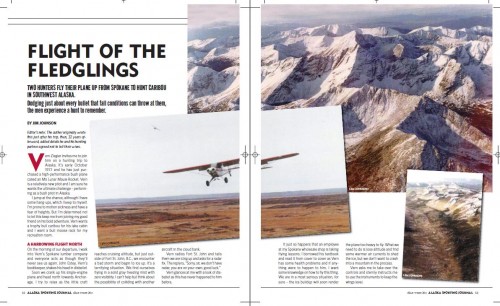
Head On With Destiny: Book Excerpt From Football Icon, Alaska Sportsman Larry Csonka
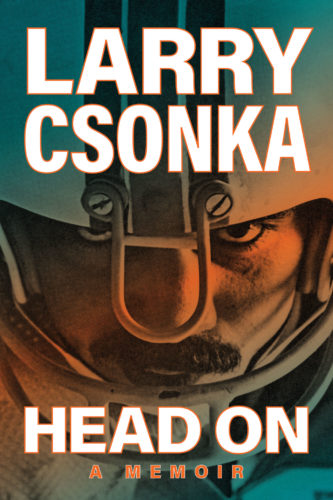
The following appears in the November issue of Alaska Sporting Journal:
There’s a scene in the 2004 based-on-real-life movie Friday Night Lights – which paid homage to the passion of Texas high school football and also spawned a hit TV series of the same name – when Odessa Permian High School running back Don Billingsley is carrying the football with passion, power and panache.
Billingsley is churning toward the goal line, shedding tacklers and spinning like a top in a key moment of the 1988 state championship game depicted in the movie’s climax.
“Billingsley is looking like Larry Csonka,” the announcer excitedly describes the style of running. It’s a pop-culture testament to what a football icon Csonka was, considering the peak of his Pro Football Hall of Fame career took place with the Miami Dolphins more than a decade before that game (and about 30 years prior to the film’s release).
Indeed, the now 75-year-old was larger than life, considering his punishing skills as a running back, his charisma – topped by a Burt Reynolds-ish mustache – and his knack for gaining those tough yards that Billingsley channeled for his high school team.
A few years back, we introduced you to Csonka for a profile (Alaska Sporting Journal, May 2014) on not only his football prowess but his love for the outdoors, particularly one of his favorite destinations, Alaska. For a guy who grew up in Ohio, starred as a college football running back at Syracuse in upstate New York, held court for the best seasons of his career near the beaches of South Florida and has roots in various other parts of the country, years later, as his new memoir suggests – fittingly, Friday Night Lights director and TV series creator Peter Berg is among those praising the book in its opening pages – some of the autobiography’s best pages reflect back to the time he’s spent in the fishing waters and hunting grounds of the Last Frontier.
“The different places you go are very rewarding. I love nature, I feel more at home in nature compared with say downtown Manhattan,” says Csonka, who played for the New York Giants near the end of his career. “I was a fish out of water (there). But in Alaska, I was at home. I like to hear the birds and the critters and see the fish jumping. That’s always going to be a part of me.”
Csonka’s life in and out of football is worthy of it being told, and supported with a taste of his adoration for fishing and hunting, it’s a fascinating read. But the days and nights he chased big game and casted for massive salmon are just as big a part of what he did with a football.
“If this book’s successful, it’s going to pave the way to come back and write about all the experiences I had in Alaska,” he says. “From the Bering Sea, hunting in the Interior, visiting remote villages in the North and Kodiak Island fishing and hunting – those kinds of experiences – we had some super gratifying moments.”
Csonka’s 75 years have been full of such special memories, both on the gridiron – besides the Dolphins’ historic 17-0 Super Bowl-winning season of 1972, in 1971 he was part of the stress and physical pounding of playing in the longest playoff game in National Football League history – and one of the longest, scariest and most harrowing days of his life on an Alaskan hunting trip gone awry and a dramatic Coast Guard rescue at sea.
The following is an excerpt from Head On: A Memoir, by Larry Csonka and published by BenBella Books Inc./Matt Holt Books.
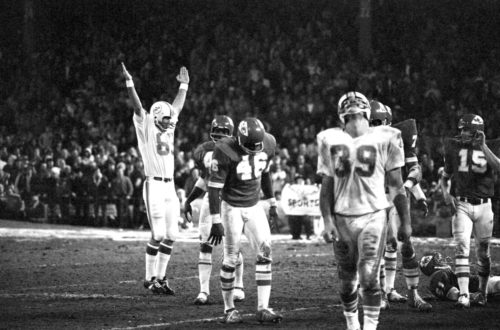
BY LARRY CSONKA
The weather in Kansas City was unseasonably warm for a Midwest Christmas Day (in 1971). Kickoff was at 4 p.m. The temperature was a balmy 63 degrees. Humidity a Miami-like 84 percent.
Our opponents had beaten the Minnesota Vikings in Super Bowl IV, and their championship roster was virtually intact.
Even though we were a 3-point underdog going in, sportswriters had predicted the Dolphins-Chiefs game would be one of the best of the season. We both had 10–3–1 records. Kansas City had the No. 1 rushing defense in the league, led by Curley Culp and Willie Lanier. We had the second- ranked rushing offense because of our outstanding offensive line and the running of Jim Kiick, Mercury Morris and me. Both teams’ defenses were tough against the run and the pass. …
The game was back and forth – and brutal – up to the very end. We were trailing by a touchdown in the fourth quarter when our offense drove the length of the field. It was a slow, ball- control, hard-hitting drive. With two minutes remaining, Bob Griese found tight end Marv Fleming for a touchdown to tie the game.
On the ensuing kickoff, Garo Yepremian drove the ball into the hands of Ed Podolak. He weaved through every one of our defenders, as well as Garo. Podolak was finally caught from behind and tackled on our 24.
Chiefs kicker Jan Stenerud had just been named to the AFC Pro Bowl team. He was considered one of the best in the league. With 90 seconds left in the game,
Stenerud trotted onto the field to kick a routine 31-yard field goal. It would send the Chiefs to the AFC Championship showdown.
Kiick turned to me on the sideline and said, “It’s over.”
We didn’t even watch Stenerud kick. Then we saw (Coach Don) Shula jumping up and down.
Kiick looked up at the scoreboard and said, “I guess it ain’t over!”
This contest had just gone into overtime. And both defenses went into overdrive. Neither offense could move the ball. By the time the first overtime – a fifth quarter – had ended, everyone on the field was dog-tired. We had beaten one another down. Griese could barely lift his injured left arm. Garo and Stenerud had both missed long field goal attempts. I lost so much water weight – nearly 12 pounds during the five hours we were on the field–that I was down to the last notch on my belt.
We were now seven minutes into a record-setting sixth quarter, and nothing we ran on offense seemed to work. The Chiefs’ defense was just too fast, pursued too quickly. That’s when Griese suddenly remembered a play assistant coaches Monte Clark and Howard Schnellenberger had designed specifically for this Kansas City defense, particularly Curley Culp and Willie Lanier, who pursued so fast. It was called a “roll right trap left.” Griese called the play in the huddle.
It just might work, I thought.
We snapped the ball from our 35-yard line; Kiick ran wide to the right, and Griese faked a pitch. The Chiefs took the bait, going after Kiick, but Griese handed the ball back underneath to me. Duped, the defenders bypassed me, still going after Kiick. With (future Pro Football Hall of Game guard) Larry Little leading the way, I hauled my big ass down the field for 30 yards before I was tackled on the Chiefs’ 36-yard line.
“Well,” I heard one official said, “that should do it.”
The referees were as ready for this game to end as we were. After three short run plays, Garo came out to attempt a 37-yard field goal. We all watched the ball sail through the air and split the uprights. We’d won the longest game in NFL history, 27–24. Some of our special teams guys, including Garo, were whooping it up, celebrating. Not me; even though it was my 25th birthday, I was too damn tired. I looked to the sky and thought, “Man, I’m glad this is over.”
It was the longest night of my life. Or so I thought.
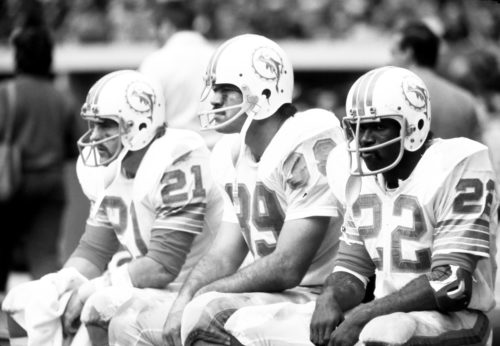
AS A KID, I loved fishing so much it inspired my granddad Heath to quote Mark Twain to me.
“You know,” Granddad would tell me, paraphrasing his favorite writer, “the secret to success is making your vocation your vacation.”
My first hunch about how to do that came in the 1970s during a guest appearance on (sportscaster) Curt Gowdy’s The American Sportsman – an outdoors TV show featuring Curt and celebrity guests who fished and hunted and, sometimes, tackled things like whitewater rafting, hang-gliding, or mountain climbing. After we finished filming a fishing episode, I told Curt how much I enjoyed doing the show – and how I’d always dreamed of living in Alaska.
“You should consider doing this,” he said …
During the first week of September 2005, we traveled to Russian-named Nikolski, the site of a 4,000-year- old village on Umnak Island in the Aleutians, to fish for silver salmon and hunt caribou. The journey to get there was a feat on its own. Umnak lies 900 air miles southwest of Anchorage. We flew commercial to Dutch Harbor, then traveled the last 100 miles in an old PBY amphibious plane.
We always faced some level of risk on our expeditions. That comes with the outdoors adventure territory. But being so far from civilization proved to be more dangerous than we’d anticipated.
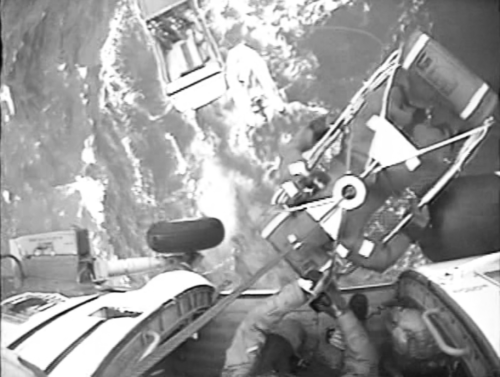

felt lucky to be alive, as the freezing-cold Bering Sea temperatures were beginning to take a toll. “That’s a testimony to your du- ration, your character. You’ve gotta make yourself go through it and stand up to it,” the now 75-year-old says. “You can’t give up because those are moments that last in your life.” (ZONK PRODUCTIONS INC.)
ON OUR FINAL DAY on Umnak, the morning sky was blue, and the seas were flat. Our guide and the boat captain both agreed we could head out on our caribou hunt before bad weather returned.
So we boarded the 28-foot Augusta D, and motored to a bay at the foot of a volcano in a remote region where caribou roamed. We anchored and made a few trips in the small, inflatable Zodiac until we were all ferried ashore.
Audrey and I set off to hunt with our guide in the lead, trailed by John Dietrich and Rich Larson, our two-man film crew. We’d just spotted some caribou when the wind started picking up and storm clouds rolled in from the sea.
Audrey radioed our captain and asked if we should abandon the hunt and return to the boat.
“No,” he said, “do what you came to do.”
Climbing the mountain was grueling. Each time we stopped for a break, Audrey checked in with our captain about the weather, and each time his answer was the same: “We’re fine.”
We stalked and finally bagged the caribou we were after. Hunting laws in Alaska are strict and specific. In general, you must transfer all meat from the field before transporting head and antlers. This helps keep the trophy hunters reined in. After the meat was harvested, hauled down the mountain, loaded into the Zodiac and transported back to the boat, our guide insisted on going back up the mountain, on his own, to retrieve the caribou head and antlers. I tried to talk him out of it because the weather was really kicking up.
“No,” he said, “I’ll be back down by the time you’re all loaded up. Just run back in and get me.”
We continued shuttling back and forth to the Augusta D. On one of those trips with John, and all his camera equipment, I was standing knee-deep in the rocky bay, pushing him off the shore, timing the now-breaking waves. The water was churning, and damn near freezing too. My hunting gear was soaked through by now and felt heavy as lead, but I managed to throw myself onto the Zodiac. Our trip back out to the boat was a rough one. ASJ
Editor’s note: Ordering information for Head On can be found at benbellabooks.com/ shop/head-on. For more on Larry Csonka, check out his website (larrycsonka.com) and follow on Twitter (Larry_Csonka39) and Instagram (LarryCsonka39).
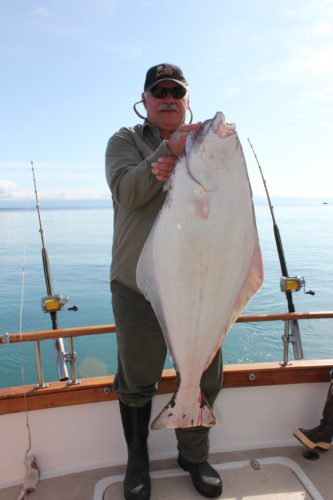
only part of his story. A lifelong outdoorsman, he has been able to explore and experience the Last Frontier, especially in his post-football life. (LARRY CSONKA COLLECTION)
Sidebar Q&A WITH LARRY CSONKA
ALASKA MEMORIES
SJ editor Chris Cocoles caught up with Larry Csonka, who discussed a variety of topics. This interview has been edited for clarity.
Chris Cocoles Congratulations on the book. You’ve led a fascinating life that’s worthy of telling your story. What prompted you to pursue this memoir now?
Larry Csonka To be honest with you, I’ve entertained it for a long time. (Former Miami Dolphin teammate) Jim Kiick and up with Larry Csonka, who I wrote Always on the Run (1973) with discussed a variety of topics. This (writer) Dave Anderson. But it was just my childhood and where I grew up, the way I grew up and all the things that influenced what I became.
CC As you went through the process of recapping your life, how emotional did you get along the way?
LC It brings back a lot of good memories, and it also brings back a lot of sad memories. I’m getting to a point in my life – like many of us – when you get over 75 years old, a lot of people are gone. And you realize the mortality of life starts to set in on you and it’s sad. I think the biggest thing I’ve noticed is how suddenly people are just gone, and the finality of it when someone passes. I think it starts with our parents when they pass – we have to face the fact that we’re all mortal and there is a final chapter. We start to reflect back a little more instead of looking forward.
CC You have a lot of content in the book about your days at Syracuse University, where you followed in the lineage of some outstanding running backs like Jim Brown, Ernie Davis and Floyd Little. You followed those guys with the Orangemen. What does that legacy mean to you?
LC There was a historical quality to it at the time, but when I was younger I was probably a little less appreciative of it than I am now. But it’s nice to be mentioned in the litany of those great athletes. Ernie, Floyd, Jim Brown, being in the company or mentioned with people like that and sharing the same school is an honor. It’s an added benefit. I liked Syracuse because it gave me a chance to do what I do well and that was run the football and work with a power (offensive) line with an in- your-face (style). The coach at Syracuse, Ben Schwartzwalder, always said you want to run the ball because when you throw it three things can happen and two of them are bad. That was his outlook. I went to the right place. I thought about going to Ohio State (Csonka grew up in Stow, Ohio), but (iconic Buckeyes coach) Woody Hayes got all the boys from Ohio together in a room and shouted “You owe it to your state (to go to Ohio State).’ I didn’t figure I owed anybody anything, so I better not play for him. That’s when I turned my sights towards Syracuse. The only regret I had being at Syracuse was having to hitchhike back and forth my freshman and half of my sophomore year to Ohio to see my girlfriend, who later became my wife. Hitchhiking 300 miles on Interstate 90 is OK unless it’s February, then it’s really bad!
CC Looking back now, you played for two legendary coaches in college and the NFL, Schwartzwalder at Syracuse and Don Shula in Miami. What did those guys mean to your career?
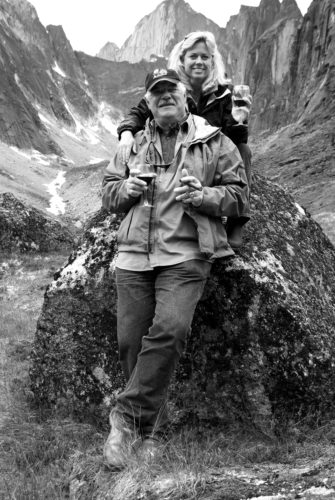
LC They were both direct and fundamental guys. They dwelled on the details and both were finite in that sense. Ben Schwartzwalder didn’t like passing the ball because he was old school. He had a little different outlook towards the passing game than what Shula did. Shula was a detail-oriented guy and he leaned more toward the pass. In the book I mentioned how we butted heads when we first met. Of course, he butted heads with everybody. When I went in to see him, I didn’t pull any (punches). I figured he was going to trade me anyway, so I told him I didn’t care for him. He looked back and said, “I don’t like you either.” So we were stuck with each other, but in hindsight, we were glad it worked out that way.
CC The excerpt from the book that we’re running compares two remarkable moments in your life, the 1971 NFL playoff game in Kansas City the Dolphins won in the longest game in NFL history, and when you were rescued by the Coast Guard during your caribou hunt in the Aleutians. Were those indeed defining moments in your life?
LC Absolutely. When you talk about Kansas City, there’s a picture of me in the book right at the instant when Garo Yepremian kicks the (game-winning) field goal after (almost) six quarters of football. I was dog tired. I was really happy we won, but I was also just glad it was over. I think I lost between 14 and 15 pounds. It was a brutal head to head match.
CC And then, the life-and-death experience in Alaska had to be something extraordinary to go through, when looking back on it.
LC The physical and mental fatigue of playing in the longest game and feeling relieved it was over and the angst of being adrift and then rescued was similar. Although nothing compares to how I felt when I saw that Coast Guard helicopter arrive after we’d been at the mercy of the Bering Sea for some 17 hours.
But both are a test – to your stamina, your character. You’ve gotta make yourself go through it and stand up to it. You can’t give up. Those are moments that last your lifetime. You’re glad they were there and you’re glad they’re over. And you’re glad you’re alive. And that’s the similarity between those moments. I was glad the (game) was over and was glad to see that helicopter, because Audrey and I and our crew were going to live.
CC What did you learn about yourself from that experience and others in Alaska?
LC I had always grown up longing to be on the frontier and now I was finding out that Alaska was the Last Frontier. What I learned about myself when going up there is that if you last long enough and aspire long enough and work at it hard enough, you end up reaching your goal. I stuck with it. I wanted to go to Alaska from the time I was 8 years old. I longed for it, thought about and dreamt about it. And when an opportunity presented itself after pro football, I seized the opportunity and just fell in love with it. I wanted to see every square mile and that’s just impossible for anybody. But I came close.
CC Do you kind of feel like your life would have been unfulfilled without your Alaska memories?
LC One way or another, I feel I would’ve found a way to get there. I longed to go for so many years. I needed to be there. But Alaska wasn’t getting any closer with all my commitments to football getting in the way. Football was rewarding, but at times I worried that dream was slipping away because I just couldn’t take the time to go. Then, finally, when the opportunity was presented, I decided to go lock, stock and barrel. And that’s what we did. We managed to find a few people who shared our enthusiasm and wanted to put us on TV (Csonka’s North to Alaska show).
CC You mentioned to me that someday you’d like to write another book solely about your time in Alaska. Why is that so important to you?
LC (Alaska) is a part of me. I think it has that effect on most people. Whatever it is that attracts you to Alaska, that gets you there, is the reward. I’ve never heard anybody say, “I wanted to go to Alaska all my life, and then got up here and was disappointed.” I’ve never heard one person tell me that they couldn’t wait to get out of Alaska or that it didn’t fulfill what they were dreaming about.
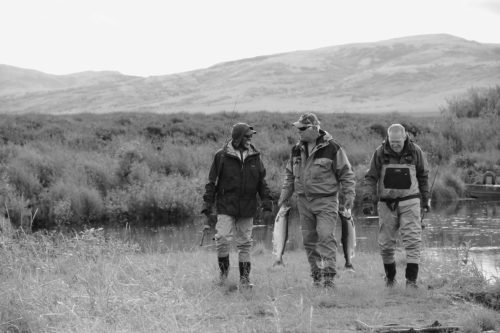
CC Tell me about the story in the book about taking your former Dolphins backfield teammates Mercury Morris and Jim Kiick fishing in Alaska.
LC [Laughs]. We all had been retired for many years, and I knew that Mercury and Jim didn’t share my enthusiasm for getting to Alaska, but I also knew them well enough to know that if they were there together, how much they’d enjoy just being out there and enjoying each other’s company. We played football together, but we didn’t spend a lot of time off the field with just the three of us together. Every time I spoke to them on the phone or I was in their presence, I would start talking to them about Alaska, and they’d both kind of roll their eyes, grin at me and say, “That’s a popular topic with you.” I’d say, “Well, why don’t you come up sometime and experience it.”
Then NFL Films decided to feature us in one of their “A Football Life” episodes and they wanted to shoot it in Alaska. I knew Jim and Merc weren’t big fans of fishing, but I hoped they’d enjoy the experience of being in a wild and remote place. And I underestimated how much they’d enjoy it. They both raved about it. They weren’t great fishermen. It was kind of a comedy of errors. They caught fish, but they just wanted to be out there to experience it and see what I’d been telling them about all these years.
CC You had a really special relationship with Jim [they were nicknamed Butch Cassidy and the Sundance Kid, which paid homage to the popular Paul Newman and Robert Redford movie of that era in the late 1960s to early 1970s]. You said the two of you became “unlikely friends” in the book.
LC When you think about it, it could have been a terrible situation, because Jim and Merc were both competitive and wanted to be on the field all of the time. Each one had a different (strength), so you had to look at what benefited the team. And they had to make that sacrifice. And only one of us could be on the field at a time. But in a lot of places, that would be something that would drive two people apart. And you understand that. They both wanted to be No. 1. And both men, instead of letting that sag into a thing of not liking each other, they did the exact opposite, which is really unique and unusual, in the sense of they were competitive. But in the sense of us being close together, we became even closer friends over it, which is just the opposite of how most people would react.
CC Jim passed away in 2020, and as you talked about the feeling of loss while working on this memoir, he’s one of several Dolphins teammates you’ve lost in recent years, including Nick Buoniconti, Bob Kuchenberg and Jim Mandich, not to mention coach Shula’s 2020 death. How difficult has that been for you?
LC I think “surprising” is a word that jumps to mind. I knew we weren’t all going to live forever. I just wasn’t ready as fast as it came. I guess we’re never ready to lose the people closest to us. Now, one-third of the team is gone. And I’ll test myself thinking about a particular player or one of the guys who was close to me; I’ll think about him and then I’ll remember they’re gone. And the shock, the losing, the finality – I guess I’m just not ready for that finality. With every one that passes, a little bit of you goes too. When Jim was around with myself and Mercury, he put an ingredient into the pie that the three of us made up, and when he’s not there and Merc and I are together, it’s obvious that there’s something missing.
CC The fact that you and your partner Audrey Bradshaw have experienced so many memories in Alaska, how nostalgic does that make you now that you’ve shared some of those adventures with your readers?
LC Audrey became a central figure in my life almost 40 years ago. I didn’t want to have an ongoing relationship with someone who didn’t share my enthusiasm for Alaska. So I pretty much laid that out. I think that needed to be proven by going where we went. And she said, “I’m onboard.” When we were out in the bush for the first time, after three days the plane didn’t show up with the supplies.
We were kind of on the rough side of things. I was the guy who started complaining; not her. She had the gumption to tell me to suck it up. I was giving her the big lecture before we went and then she threw it back in my face! We really enjoy sharing memories of our Alaska trips. Occasionally, we’ll watch an episode from the series and relive those moments. Sometimes it’s hard to believe we did all of those things. We covered a lot of ground.
CC Is there still something in Alaska that you want to accomplish?
LC You know, I didn’t get to spend as much time above the (Arctic Circle) as I would have liked to. And there are great, great folks – Native Alaskans – up there. There are a lot more stories in the far north than have been written. Just how enduring and how tough the hardships can be, but at the same time the enjoyment and the feeling of accomplishment of being there. Yes, there are still places I’d like to go. Audrey’s got them marked on the map and we talk about it. Maybe it will happen. I had a hip replaced and I’m probably 90 percent over it. Once I’m fully recovered, I’ll be up there at least six to eight weeks a year.
CC Can you kind of sum up what Alaska has meant to you and the idea of telling these stories through this book, and if you’re able to write that book, your outdoor tales?
LC I guess it’s a feeling of sharing that outlook. Remember I was talking about Jim and Merc and how they could have been right at each other; instead, they found common ground. There are a lot of folks politically at opposite ends. It’s all over our society today. But we’re all Americans and it seems like there’s a great majority of us that enjoy the wilderness. Some want to live it and some want to visit it. But those kinds of common feelings need to be rehearsed more instead of the opposite polarities being magnified. We need to find more in common with each other.
And Alaska is perfect for that. I’ve been with very strong-willed Republicans and Democrats in the same room and not enjoying each other’s company. But when we started talking about Alaska, they suddenly found out they’ve got some things in common. I’ve experienced that. Not to say that Alaska’s the solution to all the political polarity we have in the country. But it’s common ground. We have an appreciation for certain things. For me it’s the outdoors. For others it could be sports. The Dolphins were put together at a time when Miami was one of the hottest places in the nation, as far as racial and ethnic division. But then, the same people started to get together at Dolphins games and pull for one team. They had something in common and started to talk while tailgating at a game. They started enjoying each other’s company over a common thing, which was football. So that’s what we need. If football’s the necessary ingredient, or the Last Frontier, whatever it is, maybe we can become a a little more tolerant of each other. ASJ

